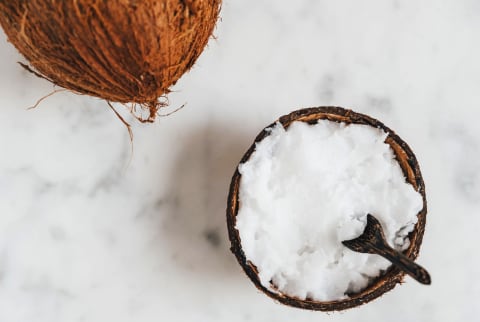We asked nutrition experts about the health profile of coconut oil—and they agree that its perks outweigh its risks. Here’s what you need to know about the benefits of coconut oil. Recent research5 also shows that coconut oil and its MCTs may help combat a handful of chronic diseases, including cancer6, diabetes7, and Alzheimer’s disease8. It also has antioxidant, antimicrobial, and anti-inflammatory properties9 and may help alleviate oxidative stress. Like most foods, coconut oil is best consumed in moderation as part of a nutrient-dense diet. Here are some of the top benefits of the plant-based fat: Another fatty acid worth noting is caprylic acid, which accounts for 8% of the fatty acids11 in coconut oil. This fatty acid has been studied for its anti-inflammatory12 and antifungal properties13 when paired with carvacrol in treating candida. Coconut oil is also a high-fat, no-carb staple in the ketogenic diet, which can assist with weight loss and improve metabolic health outcomes15. There are also a couple of small studies where researchers found that MCTs had positive effects on cognitive abilities20 and semantic memory21 in those with mild to moderate Alzheimer’s disease patients. While it’s too early to make definitive claims here, it’s promising. Keep in mind that unrefined coconut oils retain more of their nutrients (due to their processing), so they’re the better bet for skin health. “Unrefined (virgin) coconut oil is basically made from pressing coconut meat. Because it hasn’t gone through a lot of processing, you’re still getting a strong coconut flavor and smell, so that means when you’re cooking with it or using it in recipes you’re going to taste it,” says Cording. Refined coconut oil, on the other hand, goes through much more processing. Typically, the coconut meat is dried and then exposed to heat and (in some cases) chemicals that bleach and deodorize it. The end result is a more neutral-tasting oil that doesn’t have a strong coconut smell or flavor. Refined coconut oil has a higher smoke point, so it can stand up to higher-heat cooking, but the processing strips some of the phytonutrients and polyphenols24. (Unrefined coconut oil has a smoke point of about 350 degrees, while refined can go up to 450 degrees.) Clearly, there are pros and cons to both. Here, you can read up on all the differences between refined and unrefined coconut oil (and which one is better for different purposes). Cording adds that adding coconut oil to your breakfast or coffee in the morning may help with portion control throughout the day and provide lasting energy. “Fat helps with the absorption of certain nutrients (fat-soluble vitamins), so if you’re someone who takes your vitamins in the morning on an empty stomach, you might be better off having it in the morning with a healthy fat,” she says. However, if you have a sensitive stomach, you may want to eat something before coconut oil. “If someone is using too much oil in general, it may upset the stomach if you have underlying digestive issues. But that’s really about how much you’re using and not necessarily exclusive to coconut oil,” Cording caveats. Extra-virgin olive oil (the healthiest kind) has a 350-degree smoke point. Refined coconut oil can go up to 450 degrees, making it better for high-heat cooking. Olive oil is best for low-heat cooking or drizzling on top of salads or roasted vegetables after they’re cooked. At 520 degrees, avocado oil has the highest smoke point in the bunch so it’s ideal for high-heat cooking. It has a neutral flavor that makes it excellent for baking as well. Gastrointestinal side effects, like diarrhea, cramps, and gastrointestinal discomfort, can happen in those who are consuming too much coconut oil, according to Chaudry. Cutting back on your intake can help mitigate this, as can consuming coconut oil with a meal and not on an empty stomach. Allergies could also be a concern for someone who has a tree nut allergy, says Cording. Cording also recommends opting for glass containers over plastic for sustainability reasons. “Not only will you limit plastic consumption, but glass jars are reusable. They make great containers for overnight oats and smoothies when you’re on the go,” she adds. She has written twelve books and has had more than 2,000 articles published across various websites. Lindsay currently works full time as a freelance health writer. She truly believes that you can transform your life through food, proper mindset and shared experiences. That’s why it’s her goal to educate others, while also being open and vulnerable to create real connections with her clients and readers.





